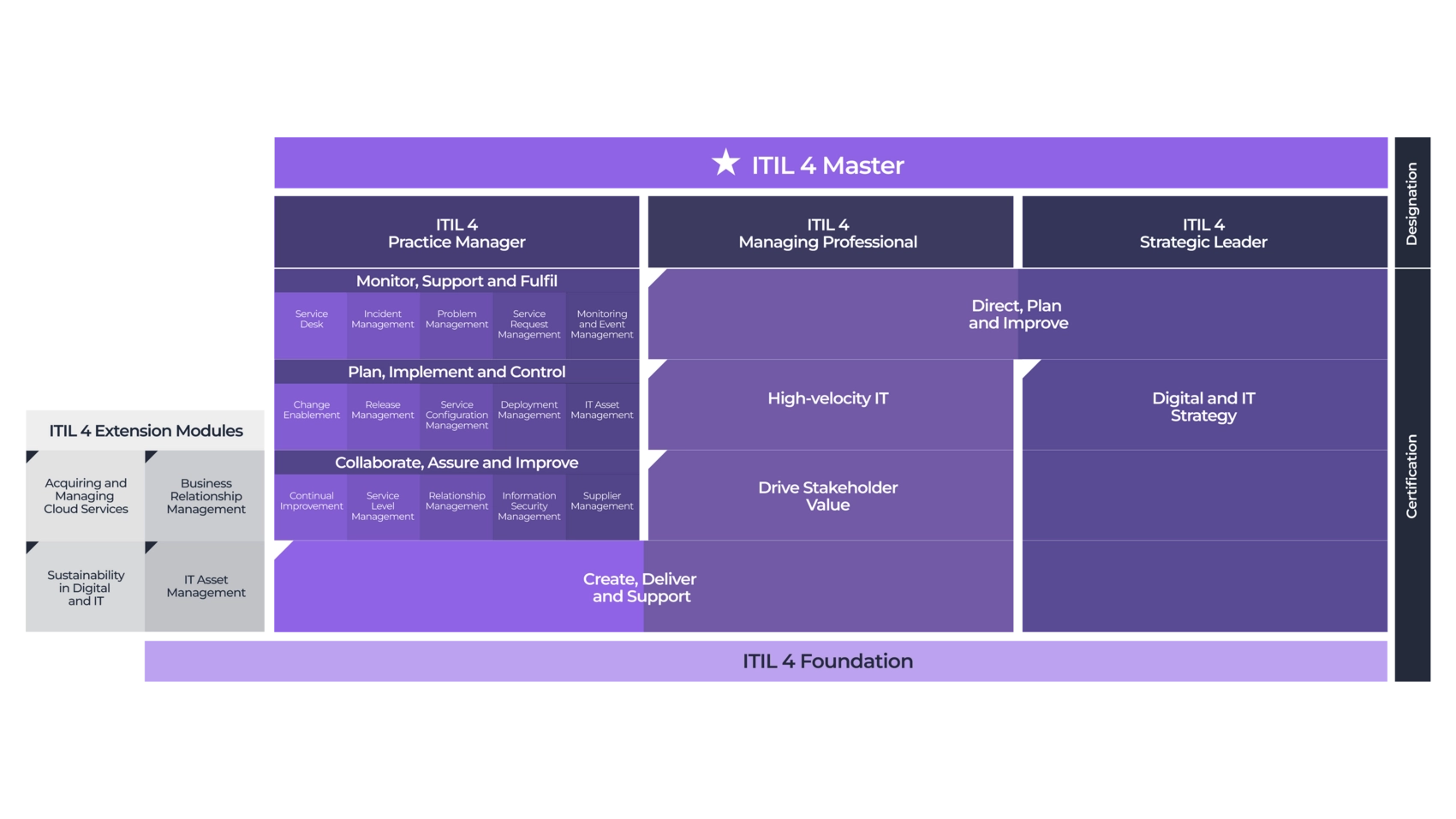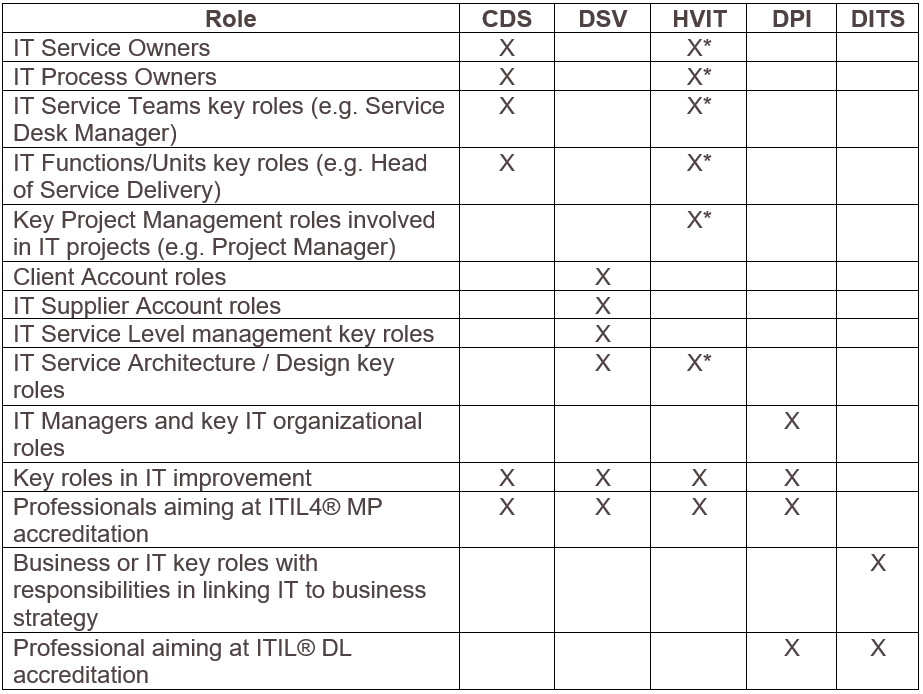Guide to choose ITIL® 4 Advanced courses Courses
Guide to choose the best suited ITIL® 4 advanced course, module, examination and certification among those of Managing Professional and Strategic Leader paths / streams
The figure below shows a graphical representation of the ITIL® 4 qualification scheme.

After passing the Foundation level, a mandatory requisite for any subsequent course and certification in the scheme, the question of which course to follow and is best suited comes naturally.
ITIL® Managing Professional (MP)
The Managing Professional (MP) stream is aimed at providing practical and technical knowledge about how to run successful IT projects, teams and workflows.
Now, let’s discuss a bit more in detail of each module, starting from the Managing Professional Level group.
ITIL® Specialist: Create, Deliver and Support (CDS)
This module covers core service management techniques, service performance and service quality and improvement methods, and is aimed at IT Service Management (ITSM) practitioners responsible for the end-to-end delivery of IT services and products.
The official target audience for this course are individuals continuing their journey in service management:
- ITSM managers and aspiring ITSM managers;
- ITSM practitioners managing the operation of IT-enabled & digital products and services, and those responsible for the end-to-end delivery;
- Existing ITIL qualification holders wishing to develop their knowledge.
This means quite a lot of people. However, in this course the focused aspect is how to create, deliver and support services. Therefore, we would recommend it to a large target audience and, among others, to:
- IT Service Owners;
- IT Process Owners (e.g. Incident Management, Change Management);
- Key roles or responsible of IT Service Management teams (e.g. Service Desk, support teams).
ITIL® Specialist: Drive Stakeholder Value (DSV)
This module covers engagement and interactions between customers, users, suppliers and partners with the service provider. Key aspects focused are Service Level Agreement design, multi-supplier management, communication, relationship management, CX and UX design and customer journey mapping.
The official target audience for this course are individuals continuing their journey in service management:
- ITSM managers and aspiring ITSM managers
- ITSM practitioners who are responsible for managing and integrating stakeholders, focus on the customer journey and experience, and/or are responsible for fostering relationships with partners and suppliers
- Existing ITIL qualification holders wishing to develop their knowledge.
As you can read, the audience looks officially quite like the one of CDS. However, the course is attractive to those with customer or supplier responsibilities in ITSM and to those with design responsibilities of the ITSM service and/or products. Among others to:
- IT Client Service Accounts;
- IT Supplier Service Accounts;
- IT Service Level Managers;
- IT Service Architects / Designers.
ITIL® Specialist: High Velocity IT (HVIT)
This module teaches how to integrate methodologies such as agile and Lean with other technical skills, including cloud, automation and automatic testing, to deliver rapid delivery of products and services.
The official target audience for this course are individuals continuing their journey in service management:
- ITSM managers and aspiring ITSM managers;
- IT managers and practitioners involved in digital services or working in digital transformation projects, working within or towards high velocity environments;
- existing ITIL qualification holders wishing to develop their knowledge.
Once again, this audience is not much different than the one addressed in the previous modules. Our recommendation is that those frequenting the CDS module, should also follow this course if the environment where they work uses agile project and product management approaches and or if they are involved in digital transformation projects (projects where the use of digital technology enables a significant improvement in the realization of organization’s objectives that could not feasibly have been achieved by non-digital means).
ITIL® Strategist: Direct, Plan and Improve (DPI)
The fourth module covers the skills needed to “create a learning and improving IT organization with a strong and effective strategic direction.” It focuses on how to leverage agile and Lean to plan and deliver continual improvements quickly.
The official target audience for this course is not clearly identified in the official syllabus. However, it is suited to those with key responsibilities in defining strategies for ITS or responsible of its (continual) improvement.
As a consequence, we recommend it to the same audience of CDS plus key IT service management roles with strategic or continual improvement responsibilities.
ITIL® Strategic Leader (SL)
The ITIL® Strategic Leader (SL) stream is for all digitally enabled services in the organization, not just IT operations. This certification focuses on how IT influences and informs business strategy. To earn ITIL® SL certification, you’ll need to pass two exam modules:
- ITIL Strategist Direct Plan & Improve;
- ITIL Leader Digital & IT Strategy.
The first module was already discussed previously in the MP stream.
ITIL® Leader: Digital & IT Strategy
This module teaches how to align the business and IT strategy and how to handle disruptive technologies. The official target audience for this course is not clearly identified in the official syllabus. However, we can say that the key audience is represented by the key roles in charge of linking the business strategy with IT (not only ITSM) strategy.
Summary
In the syllabi of Axelos, the target audience for ITIL® 4 advanced courses is quite ample or undefined. Nevertheles, we have tried to provide some guidance on how to choose the ITIL® 4 advanced modules.
The following table summarizes the recommendations.
ITIL® 4 advanced module selection matrix.
*If involved in environments/project working with agile approaches.
In summary, we could say that there are two key entry points (depending on role) in MP stream: CDS and DSV. HVIT is a useful integration for those involved in agile working environments and digital transformation. DPI is suited for people in charge of IT strategic direction. Roles with continual improvement responsibilities or aiming at MP certification will be interested in all MP modules. In this case, the recommended sequence would be CDS, DSV, HVIT, DPI.
Roles with interest in the linkage between business and IT strategy will be interested in DITS module.
Finally, those aiming Digital Leader accreditation will have to pass DPI and DITS (in such a case, we recommend DPI first).

 login
login